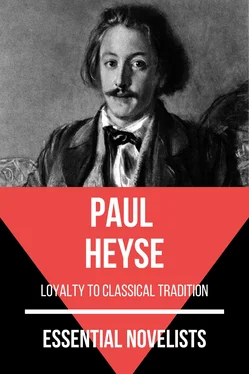"This always affected my mother unpleasantly, and my sisters listened to these constantly repeated tales without any special pleasure. They had very little imagination, and were completely absorbed in the petty cares and joys of the present; but these fairy like descriptions so filled my mind, that the wretched reality of my life became more and more distasteful to me. I dreamed of nothing but magnificence and splendor, a luxurious existence without any cares, and of kings and princes paying court to me. I gave grand names to my dolls, constantly practiced speaking French, which my father approved, and when one day at dinner, the conversation turned upon what each of us wanted to become. I, precocious little ten-year-older, exclaimed: 'I will be a duchess!'
"My mother angrily reproved me: 'it was wicked pride, I must try to become good and pious, modest and industrious'—you can probably imagine all I heard. My father was perfectly silent. Afterwards when I was alone with him, he drew me, still violently weeping into his arms, kissed my wet eyes, and said only: 'Sois tranquille, ma mignonne. Tu vas gáter tes beaux yeux avec ces larmes.' From that day, at home and at school, whenever any one wanted to tease me, I was called 'Duchess Toinette.' But I was not at all annoyed; on the contrary I liked the nickname far better than the simple 'Toni,' my mother usually called me. After a time as I became more sensible and perceived that my father's little pension would not enable us to live in ducal style, I might have lost this sickly desire for royal luxury, and in time learned to be satisfied with a modest income, like my sisters. But unfortunately there was a constant temptation close at hand. For years, our little city had been under the rule of a petty prince, and the ancestral castle still stood in all its magnificence on a wooded height, which could be climbed in ten minutes. The prince himself had been suddenly killed in the prime of life, while hunting. The solemn funeral, which all the inhabitants flocked to attend, was the first memorable spectacle that had left a lasting impression on my childish brain. Since that time, the princess had lived in the castle with her children, a pretty little boy some years older than I, and several daughters. The household was maintained in the same style as before, and after the year of mourning had expired, new guests and entertainments brought fresh gayety.
"To be sure, we plebeian children only witnessed these things through the railing of the park, or if we could slip in, through the lofty windows that looked out upon the garden. But it was more than enough to give new food to my ducal dreams. The superb toilettes, the countless candles, the graceful curtseys, smiles, whispers, and flirtations, which I witnessed for hours, with my face pressed against a window pane, fairly intoxicated me. I would gladly have spent my life in the midst of such surroundings, and something told me I should have harmonized with them well. At least I did not understand my sisters, who always grew red and foolish if any of the strangers in their walks about our little city condescended to exchange a few gracious words with us children, who were standing curiously outside the gates. I always had an answer ready and made my little curtsey so easily, that more than once the ladies noticed me particularly, and exchanged with each other in French, flattering words about my looks, not a syllable of which escaped me.
"My father, who went to the castle, as he gave dancing lessons to the princess' children, often repeated the compliments that had been paid me there, and held me up as a pattern to my sisters. Of course this was not agreeable to them or their mother, and often caused unpleasant scenes. Often he brought home all sorts of dainties, confectionary, and rare fruits. The butler was his god-father. This again made my mother angry and with reason; for since I had tasted these delicacies, our simple fare, of which there was often scarce enough, was far too coarse for me, and I preferred to push away my plate and fast, rather than to eat a dish that didn't suit me. At such times I satisfied myself with the fruits and berries to be found in the garden and woods, and it was only strange that, in spite of all this, I did not grow thin or weak, but retained the fair complexion and red cheeks which, as I plainly perceived, were the envy of the rouged countesses and princesses.
"And some one else there was who admired them; this was no less a personage than His Highness, the little prince. He was an odd little mortal then, and I think will always remain so; thin and fragile as if made of porcelain, and equally stiff and polished, with a doll's face that would have been very pretty if one could only have believed it alive. And in an equally lifeless manner, as if he feared he might break while doing it, he paid court to me. We had met him once in the park, a horde of children dashing through the shrubbery with loud hurrahs; catch, and hare and hounds, were our favorite games. He had come there, Heaven knows how, without his tutor, and we suddenly grew quiet, more on account of his uncanny stiffness and fashionable dress, than from respect. But he was inclined to be especially gracious, to me in particular condescension itself, and I, stupid little monkey, prided myself upon it not a little. Dear me, I was only ten years old, but the idea of being a duchess was firmly impressed upon my mind, and I actually believed that he would marry me and realize all my fairy visions. So for several years this absurd secret flirtation, which wearied as much as it flattered me, continued, until at last the princess discovered it. To be sure, my chivalrous little lover declared that he had never had any intention of making me his wife, but merely his mistress. In spite of this precocious discrimination, however, it was thought better to break off the childish intimacy once for all; so I again became a duchess in anticipation, and even my father was no longer permitted to enter the castle.
"I remember, after this time, that is when I was grown up, but one occasion when I again saw the park and even the interior of the castle. Some cousin or nephew of my kind father came to visit us, for whom, during the few days of his stay every effort was made to place our usual homely mode of living in the most endurable light. As we could give him no special entertainment at home, we were obliged to make excursions abroad, and it fortunately happened that the princess and her children had gone to some springs. So under the care of the butler, we visited all the rooms, into which hitherto I had only peeped. My father was delighted to be able to mount his hobby, and constantly related how this, that, and the other had been handsomer, richer, or more tasteful in Paris. I could only gaze in silent astonishment, and yet it seemed to me as if all this were a matter of course, and I, if only permitted to do so, could use these costly articles as carelessly as if born in such a sphere. On the following day, the cousin stammered out a confused proposal of marriage, and, to make his worthy person more agreeable to me, described the charms of his own home—he had an oil cloth manufactory in a tolerably large city. I should like now to recall the expression with which I gave him a positive refusal. It was certainly one of which no full blooded duchess would have had cause to be ashamed.
"No! if I could not have my faithless porcelain prince, I would never take the first plain workman I met. When the cousin departed, my mother looked at me with sincere sorrow. 'Poor thing,' said she. 'You're not to blame, because others' (she meant my father) 'have turned your head. But tell me, for what are you really waiting'—I answered that I was waiting for nothing and for no one, and only desired to be permitted to live as I was doing:—this was only half true. You may well suppose that I was waiting for no lover, for I have frankly told you that up to this time I have been unable to discover any talent for sentiment in my nature. But to continue to live as I was—no, I could not have endured it forever.
Читать дальше












